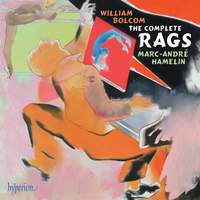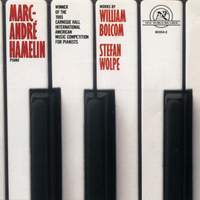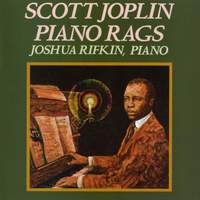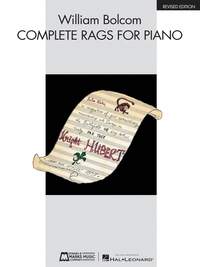Interview,
Marc-André Hamelin on the Rags of William Bolcom
 In early June I and my colleagues were bowled over by a new recording of ragtime compositions from Marc-André Hamelin – the complete rags of William Bolcom, who with a handful of colleagues had led the charge in the late '60s and early '70s for a revival of this uniquely American genre of music.
In early June I and my colleagues were bowled over by a new recording of ragtime compositions from Marc-André Hamelin – the complete rags of William Bolcom, who with a handful of colleagues had led the charge in the late '60s and early '70s for a revival of this uniquely American genre of music.
In reviewing the recording I found myself not only entranced by the music but also astonished by Bolcom's revelations of how obscure and forgotten ragtime had become. The idea of nobody having even heard of Scott Joplin, in particular, stuck with me and I was fascinated by the whole story of ragtime's rise, fall and resurrection.
So, when the opportunity arose to talk to Marc-André himself about this recording, naturally I jumped at it; not merely a prodigiously accomplished pianist but also an explorer and advocate of repertoire, Marc-André discusses how these rags came about, how the genre bounced back from a period of neglect, his own musical friendship with Bolcom and more.
It’s a truism to refer to any album as “unique” but this programme certainly stands out. How did you become involved in this recording project?
Well, initially I'd be tempted to turn that round and ask: What makes this more 'unique' than, say, an all-Florence Price album or an all-Liadov album, or any other less-recorded composer?
Bolcom is very much more familiar here than in the UK or on the Continent, if only for a few things. The Graceful Ghost rag is a classic here. He's had really quite a long career and produced some pretty important things, but is much less well-known elsewhere. So that's one reason.
One day I was looking at his collection of rags, which has actually come out in one book - and by the way, a lot of them are far from easy, reflecting Bill’s own skill as a pianist and exploiting that resource much more than the original rag writers did - and I thought this would be a worthwhile project. It had been done once before, about twenty years ago, but on a smaller label. Also there had been four or five new rags written since - and I knew that Bill didn't intend to write any more. He's been categorical about that.
Most importantly, I guess, I don't do these recordings for me. I really do it for pianists to explore, and the public to enjoy, something they maybe don't know about. I'm just as interested in encouraging people to play this music as to listen to it.
Why did you end up focusing in just on Bolcom, rather than the handful of other composers around him who helped drive the ragtime revival in the late ‘60s and early ‘70s?
I wanted to have a more discographical focus - I very well could have included Bill Albright and a few others, because there was quite a bit of new style rag fever going around, and Bolcom and Albright really started it. After Bolcom discovered Scott Joplin and especially the opera Treemonisha, he was just completely consumed by this new musical form. His main rag-writing activity only lasted a few years - after that they became more sporadic - but he produced some really significant things. They're full of interesting details which could have come only from someone who was completely classically trained; the harmony is so interesting and so involved at times that it is a further spicing-up of what we've heard in Joplin's rags.
The very idea of Scott Joplin being, back then, a name so obscure that he needed discovering seems almost inconceivable today...
You just have to look at the recorded history of Joplin's music; the first significant records were really Joshua Rifkin's three LPs on the Nonesuch label, which came out in about 1970. A lady named Ann Charters had recorded some of them quite a few years before, but that was on a more obscure label and I don't think it made much headway, so Rifkin's were really a significant awakening.
After that the fact that some of the music was used in the movie The Sting from 1973 opened the floodgates. Suddenly everyone knew The Entertainer and it went from there.
The recording of The Entertainer featured in the soundtrack to The Sting
You have something of a musical relationship with Bolcom yourself – you’re the dedicatee of his 1986 Twelve New Etudes, which you made the first recording of. How closely have you worked with him over the years?
They're partially dedicated to me, yes. That collaboration was actually when we met. To backtrack for a moment to the first time I heard his name - in the 1970s my father was a subscriber to a magazine called the Piano Quarterly, which subsequently became the now-defunct Piano & Keyboard. There was an article about forgotten pieces that pianists should pay more attention to, and among those was Bill's first set of Etudes (not the ones I recorded), which date from the early '60s. A couple of first lines reproduced in the article looked really quite avant-garde, and that really piqued my interest. Not too long after that I became acquainted with a recording that Bill had done on Nonesuch, an LP of rags called Heliotrope Bouquet, named after one of Scott Joplin's rags. It featured some Joplin, but it was something of a cross-section and it included three rags of his own – I could hardly believe it was the same composer!
He grew up thoroughly in that Domaine Musical era - he'd spent some time in France - so he was thoroughly acquainted with that musical language. He wrote some very atonal and serialist things. So that was the initial reason for my fascination. Then in 1985 I won the Carnegie Hall American Music Competition, and part of the prize for the winner was an invitation to the Cabrillo Festival in California, and the two composers in residence that year (this was in 1986) were Arvo Pärt and Bill Bolcom.
I really got to know Bill around that time, and it was suggested that I should perform the first nine of the twelve new Etudes. The last three hadn't been written yet; he had set out to write this new set for the pianist Paul Jacobs but in 1983 Jacobs ended up being one of the first AIDS casualties among musicians. It stopped Bill completely in his tracks and he left the first nine Etudes aside. Anyway, I learned them; a couple of other people had also each performed a few of them, but apparently it was my performance that got him to complete the set, just a couple of months after. I then performed them a few times and included them on my very first CD.
Paul Jacobs performs Bolcom’s Graceful Ghost rag
While we've been on wonderful terms, we don't see each other very often - but he's always been marvellous to me and I've done what I can for his music. The recording session for these rags ended up being in Worcester, Massachusetts; we would have done it in England, as I normally do with my usual producer Andrew Keener, but for purely pandemic-related reasons I had to stay in the States so the session was eventually produced by Judith Sherman, who is really a legend in the field and who was wonderful to work with.
Of course I wanted Bill present for the session, but because he didn't want to travel - again for Covid reasons - we had him on Zoom for the entire thing! That was a lot of fun - though through Zoom the piano sound is pretty terrible, so when he heard the end result he must have been pleasantly surprised. There were a few things he asked to be approached differently - there was one rag in particular in which I'd got the tempo and the spirit wrong. He corrected me on that and it took me a while to get it - but because we were recording I had to adapt to it as quickly as I could. I'd actually been performing it in a way that was closer to a recording he himself had made, many many years before! But that's not the way he wanted it any more.
There's a couple of rags after which his reaction was just one syllable, and that was so wonderful that I considered including them on the recording! But I was voted down and that's probably just as well. Modesty prevents me from telling you exactly what they were...
Despite the revivalists’ clear admiration for the creators of the ragtime tradition, and its inheritors in their own time, do you think there’s an appropriative component to a school of white composers latching onto a genre profoundly associated with African-American communities?
For me, it's very simple: Music is music and I don't believe that these kinds of frontiers should exist. I think these people really realised that - they took it as very exciting, refreshing, beguiling music and they didn't care about its provenance.
If I'm not mistaken - though I may be musicologically wrong on this - the rag composers of the time were far from being exclusively Black, and this is backed up by some publications put out by Dover Publications of early ragtime in which I think quite a few of the composers were white.
The rag revival “craze” seems to have exploded out of nowhere, and burnt itself out just as quickly; by the late ‘70s it was all but over. Where did the first seeds of this come from, and how did it gather pace in such an incredibly short space of time – and why didn’t that frenzy of musical and compositional interest last?
It might have had something to do with the fact that by then there was very little printed music available in a more popular vein. So anything that might have come out of that kind would have been a great novelty - it might just boil down to that. Of course it was exciting for the listening public as well. Also the fact that the Rifkin, and later Bill's Heliotrope Bouquet recording, came out on a classical label - that got a lot of people to pay attention.
So when Bolcom started taking an interest in Treemonisha and got the ball rolling, was that just sheer luck?
In a sense. The person who wrote the seminal book on ragtime, They All Played Ragtime - which was already quite a few years old when Bill discovered rags - was Rudi Blesh. He happened to teach at the same institution that Bill was in at the time. Bill mentions this in the preface to the book of rags:
One day in the fall of 1967 I had lunch with Norman Lloyd, then head of the Music Division for the Rockefeller Foundation, who mentioned having heard of a ragtime opera by Scott Joplin. "Who is that?" I asked. Few people in 1967 knew the name Scott Joplin, and Norman told me that Joplin was the composer of the Maple Leaf Rag, but that his opera existed only in legend. For some reason I immediately went on the trail of Treemonisha, only to find out that no-one, not even the Library of Congress, the Lincoln Center or the Schomburg Collection in Harlem, had it. That is, until I asked my colleague Rudi Blesh at Queens College [New York]. We had barely ever said hello before, as we rushed in and out of the same office on the way to teaching, but one week I asked him if he knew where I could find a copy of the opera, as all the usual suspects had nothing. When he said "I have a copy of the vocal score; shall I bring it next week?" I nearly fell off my chair.
William Bolcom discusses the Graceful Ghost rag and the story of his discovery of the Treemonisha score in an interview with Mark Clague c.2011
It's a great story. In fact this kind of serendipity has happened to me a few times when I've been looking for something; you just find the right person.
After immersing yourself in this style for so long, have you tried your hand at writing any rags of your own?
Oh, at the beginning I definitely did - but the results were so lamentable... I'd do a better job today, but back then I absolutely had no experience, and they were all plagiaristic; the less said about that the better!
It was a joy to work on this project, and even though we haven't seen each other a lot of times over our lives I very much consider Bill a dear friend. It's been a wonderful experience.
Marc-André Hamelin (piano)
Available Formats: 2 CDs, MP3, FLAC, Hi-Res FLAC
Marc-André Hamelin (piano)
Available Formats: CD, MP3, FLAC
Joshua Rifkin (piano)
Available Formats: MP3, FLAC






